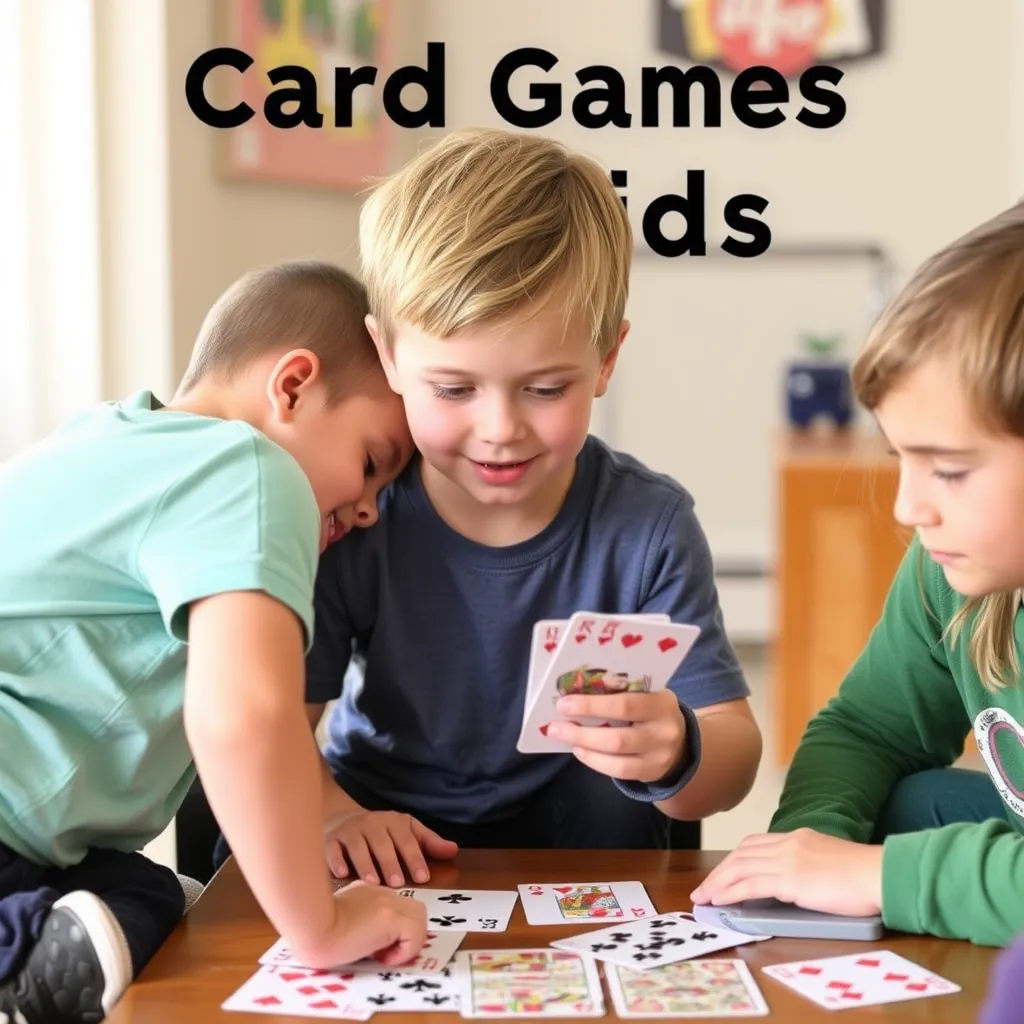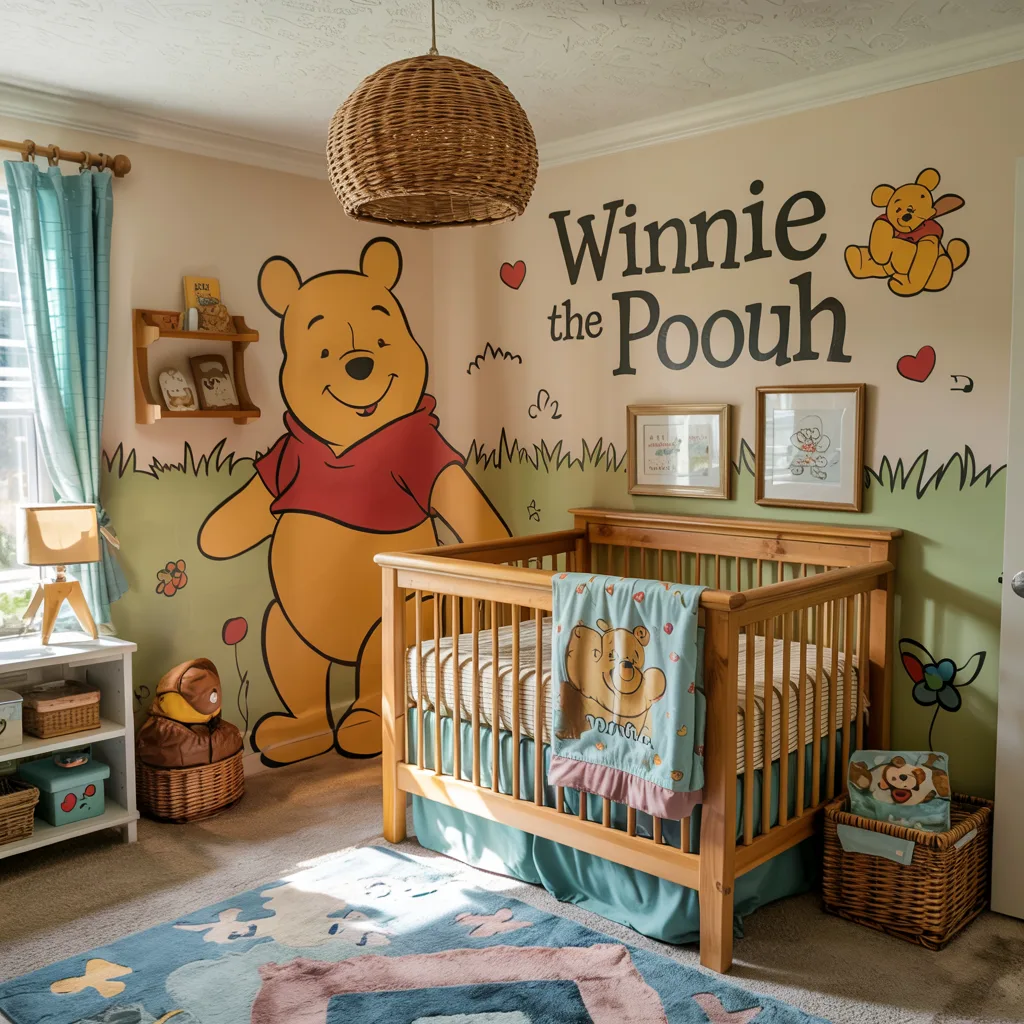Looking for a fun and engaging way to spend quality time with your kids? Card games For Kids are the perfect solution! They’re not just entertaining – they also help develop important skills like counting, strategy, and social interaction. In this article, we’ll explore 10 exciting card games that are easy to learn and perfect for children aged 5 and up. Get ready to shuffle, deal, and create lasting memories with your little ones!
Table of Contents
| Key Takeaways |
|---|
| – Card games improve cognitive skills and social interaction – Simple rules make these games accessible for ages 5 and up – Most games require only a standard deck of cards – Great for family bonding and screen-free entertainment |
1. Go Fish: A Classic Favorite
Go Fish is a timeless card game that’s ideal for younger players. It’s simple to learn and helps kids practice number recognition and set collection.
How to Play:
- Deal 5 cards to each player (7 for 2 players)
- Players take turns asking others for cards to make pairs
- If the asked player doesn’t have the card, they say “Go fish!”
- The asker draws from the deck
- Game ends when all pairs are made
This game is perfect for developing memory skills and teaching kids to take turns. Plus, it’s a great way to practice good sportsmanship!
20 children’s humorous short stories to Read
Fun for children with Engaging Activities to Boost Happiness and Learning
2. Crazy Eights: Wild and Wacky Fun
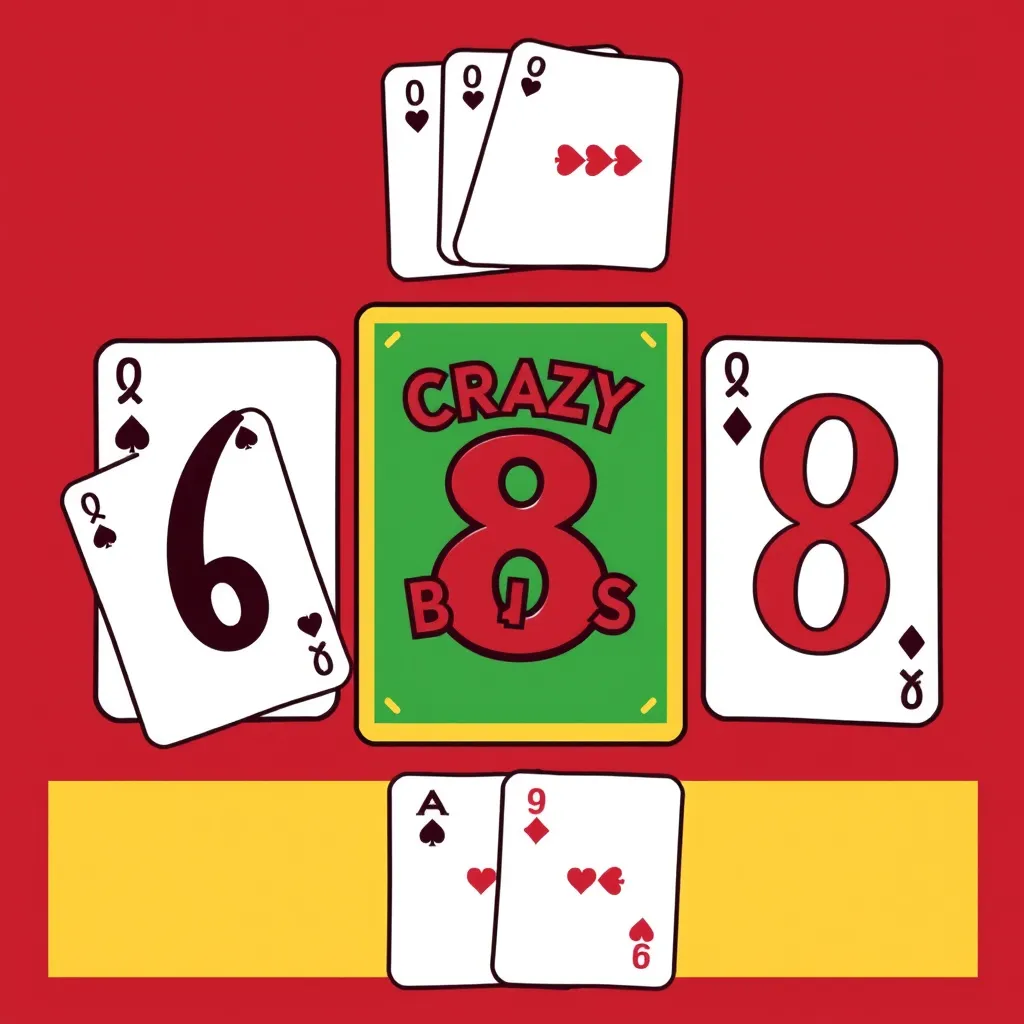
Crazy Eights is an exciting game that introduces the concept of following suit or number. It’s a bit more challenging than Go Fish but still easy enough for most kids to grasp quickly.
How to Play:
- Deal 5 cards to each player
- Place one card face-up to start the discard pile
- Players take turns laying down cards that match the suit or rank of the top discard
- Eights are wild and can be played anytime
- First player to get rid of all cards wins
This game helps kids learn to think strategically and plan ahead. It’s also a great way to practice basic math skills as they keep track of the cards played.
3. Old Maid: A Giggle-Inducing Classic
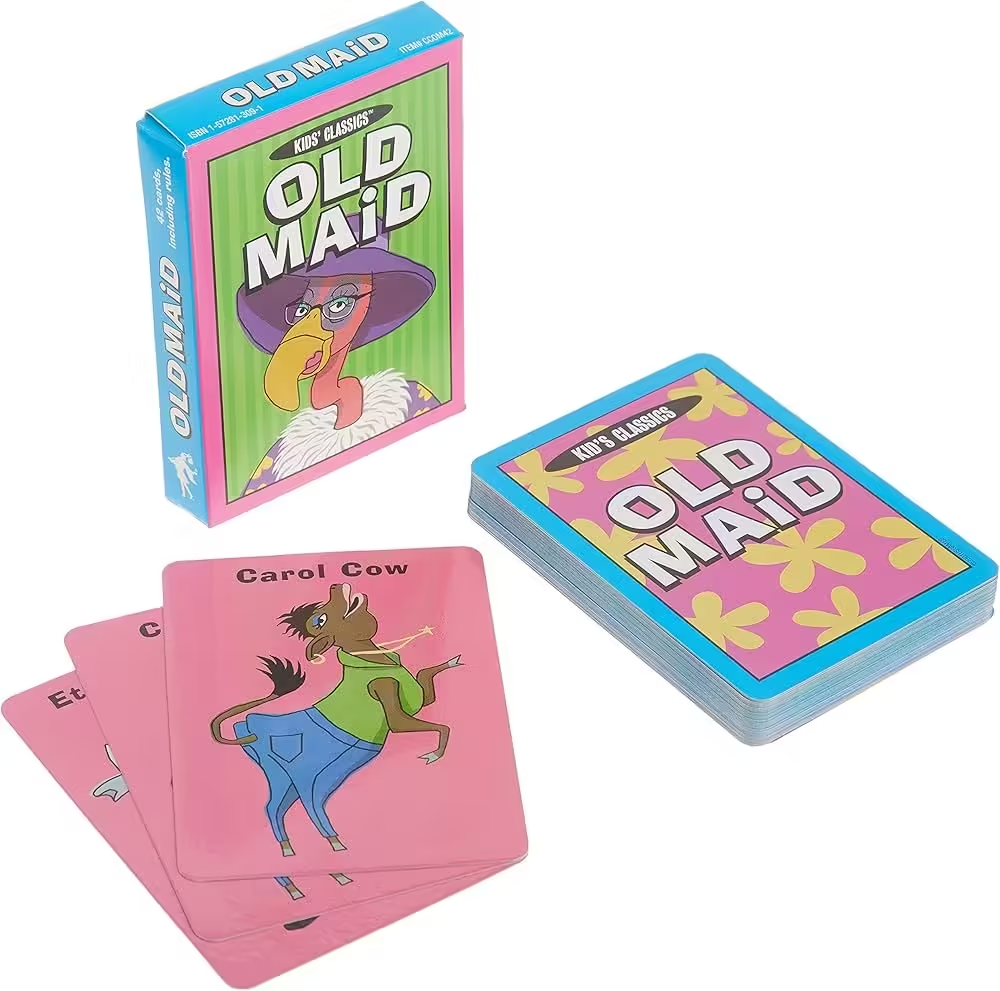
Old Maid is a hilarious game that’s sure to have the whole family laughing. It’s perfect for younger kids and helps develop matching skills.
How to Play:
- Remove one queen from the deck
- Deal all cards to players
- Players discard any pairs they have
- Take turns drawing cards from the player to their left
- Continue until all pairs are made
- The player left with the Old Maid (unpaired queen) loses
This game is excellent for teaching kids about probability and developing their poker face!
4. Snap: A Fast-Paced Matching Game
Snap is an energetic game that tests reflexes and observation skills. It’s perfect for kids who love a bit of excitement!
How to Play:
- Deal all cards face-down to players
- Players take turns flipping over their top card
- If two cards match, players race to shout “Snap!” and slap the pile
- The fastest player wins the pile
- Game ends when one player has all the cards
Snap is fantastic for improving concentration and hand-eye coordination. Just be prepared for some noisy fun!
5. War: A Battle of Numbers
War is a simple game that’s perfect for teaching number comparison and basic addition.
How to Play:
- Deal entire deck between two players
- Both players flip over their top card simultaneously
- The higher card wins both cards
- If cards are equal, players enter “war” by placing three face-down cards and one face-up
- The higher face-up card wins all cards played
- The game ends when one player has all the cards
War is an excellent game for practicing patience and understanding the concept of greater than and less than.
6. Memory: A Brain-Boosting Challenge
Memory (also known as Concentration) is a fantastic game for improving recall and concentration skills.
How to Play:
- Spread cards face-down in a grid
- Players take turns flipping over two cards
- If cards match, the player keeps them and goes again
- If they don’t match, cards are turned face-down
- The game ends when all pairs are found
This game is excellent for developing memory skills and teaching kids to pay attention to details.
7. Slapjack: A Rowdy Card-Slapping Game
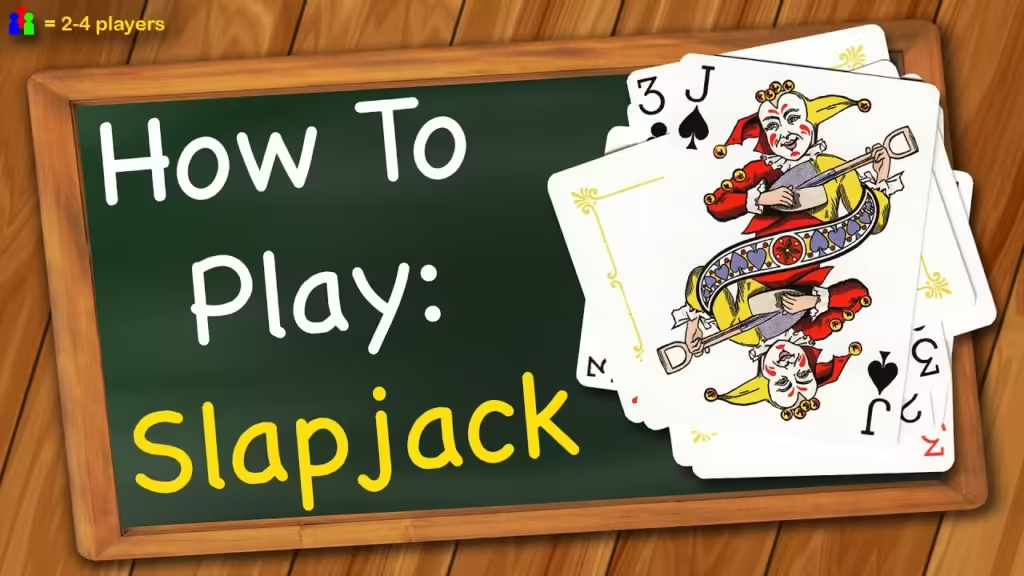
Slapjack is an energetic game that’s perfect for burning off some energy while having fun!
How to Play:
- Deal the entire deck face-down to players
- Players take turns flipping cards face-up into a central pile
- When a jack appears, players race to slap it
- The first player to slap the jack wins the pile
- The game ends when one player has all the cards
Slapjack helps improve reflexes and teaches kids to stay alert. It’s also a great way to burn off some energy!
8. Spoons: A Hilarious Grab-and-Go Game
Spoons is a fast-paced game that combines elements of matching and musical chairs. It’s sure to have everyone laughing!
How to Play:
- Place spoons in the center (one fewer than the number of players)
- Deal four cards to each player
- Pass cards around the circle, trying to collect four of a kind
- When someone gets four of a kind, they grab a spoon
- All players then race to grab the remaining spoons
- A player without a spoon is out
Spoons are perfect for larger groups and help kids practice quick decision-making and hand-eye coordination.
9. Rummy: A Classic Card Game for Older Kids
Rummy is a more advanced game that’s great for older kids and adults alike. It helps develop strategic thinking and planning skills.
How to Play:
- Deal 7 cards to each player (10 for 2 players)
- Players try to form sets (3 or 4 of a kind) or runs (3+ consecutive cards of the same suit)
- On each turn, draw a card and discard one
- Players can pick up the top discard instead of drawing
- The first player to get rid of all cards by forming sets and runs wins
Rummy is excellent for developing pattern recognition and strategic thinking skills.
10. Uno: A Colorful Card Game for All Ages
While not played with a standard deck, Uno deserves a mention as it’s a fantastic card game for kids. It’s easy to learn and endlessly entertaining.
How to Play:
- Deal 7 cards to each player
- Players take turns matching the top card by color or number
- Special cards like “Skip,” “Reverse,” and “Draw Two” add excitement
- Players must say “Uno” when they have one card left
- The first player to get rid of all cards wins
Uno helps kids learn about colors, numbers, and following rules. It’s also a great game for practicing strategy and planning ahead.
“Card games are a fantastic way to bond with your kids while helping them develop important skills. They’re portable, affordable, and provide hours of screen-free entertainment!” – Dr. Amanda Johnson, Child Development Specialist
Benefits of Playing Card Games For Kids
Card games For Kids offer numerous benefits for children’s development:
- Cognitive Skills: Improve memory, concentration, and problem-solving abilities
- Math Skills: Practice counting, addition, and number recognition
- Social Skills: Learn turn-taking, following rules, and good sportsmanship
- Fine Motor Skills: Enhance hand-eye coordination and dexterity
- Family Bonding: Create lasting memories and strengthen relationships
- Screen-Free Entertainment: Provide a fun alternative to digital devices
For more information on the benefits of card games for children, check out this article from Scholastic.
Tips for Playing Card Games with Kids
- Start with simpler games and gradually introduce more complex ones
- Be patient and explain the rules clearly
- Make it fun by adding silly rules or forfeits
- Use card games as an opportunity to teach good sportsmanship
- Adapt games to suit your child’s age and skill level
Remember, the goal is to have fun and spend quality time together. Don’t worry too much about strict rules or winning – focus on enjoying the experience!
Frequently Asked Questions
1. At what age can kids start playing card games?
Most children can start playing simple card games around age 4 or 5. Games like Go Fish and Memory are great for younger kids, while more complex games can be introduced as they get older.
2. How can I make card games more educational?
Incorporate counting, simple math, or even spelling into the games. For example, you could use educational card games specifically designed to teach certain subjects.
3. What if my child is a sore loser?
Use card games as an opportunity to teach good sportsmanship. Emphasize having fun over winning, and model gracious behavior whether you win or lose.
4. Can card games help with ADHD?
Yes, card games can be beneficial for children with ADHD. They help improve focus, impulse control, and turn-taking skills. Check out our article on card games for ADHD for more information.
5. How often should we play card games?
There’s no set frequency – it depends on your family’s schedule and preferences. Even playing once a week can provide great benefits and create a fun family tradition.
Card games for kids are a fantastic way to combine learning and fun. Whether you’re looking for a quick game to play before bedtime or planning a family game night, these 10 card games for kids are sure to provide hours of entertainment. Remember, the most important thing is spending quality time together and creating lasting memories. So shuffle those cards, deal them out, and let the fun begin!
For more ideas on family activities, check out our articles on outdoor games for kids and rainy day activities. Happy playing!

